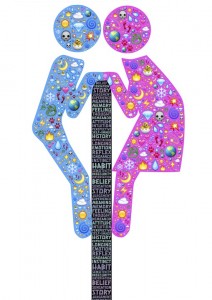Making Emotional Connections Through Writing
Making emotional connections through writing is always at the top of my list of goals, whether I am writing poetry or prose.

When I tell people I am a writer, I get the usual questions and responses. “What have you published?” “Someday, I’ll write something.” “I wish I had time to write.”
For me, writing isn’t something I want to have done. It’s something I need to do, and not just “when I have the time.”
I have been writing for years, in journals, on napkins and little scraps of paper, hoping to reach out and touch someone with my words, hoping to connect, and always finding some understanding of my own feelings and emotions.
I started out on this journey simply writing. Short stories and poetry came first, which led to reading my work in front of hundreds of people, attending writing seminars and conferences, joining writer’s groups, studying my craft, reading hundreds of books on writing, submitting to countless publishers, and entering multiple writing contests.
I managed to have a few things published in journals and magazines, and I self-published several chapbooks of my poetry. I even won a couple of local contests.
In that past few years, I have had several novels published, have gained a readership and have made multiple author appearances and now I even teach creative writing. The journey is going well and I continue to find ways to reach out and connect with people through my writing. My favorite comments are those that come from readers who fall in love with the characters, those who become fully engaged in the journey and especially those who are emotionally moved by my stories.
Now, I have shared a lot of my writing with my mother over the years. And although much of my writing is not her cup of tea (she likes non-fiction, I like fantasy, etc.) I have always gotten encouragement from her. But I will never forget the one poem that finally touched her heart and moved her emotionally.
The poem isn’t very long (no more than 30 lines), but it sums up all the fears and feelings and frustration of my relationship with my abusive grandmother. My mother’s mother. A woman who had been demanding and dominating and downright mean. A woman who had become confused and helpless in her old age, and who had to be cared for in the fading years of her life.
As my grandmother lay dying, I did a lot of journaling about my relationship with her. I had a lot of time to think and write because she clung to life as stubbornly as she’d held onto her anger and prejudices during her lifetime. It was nearly ten days before she finally succumbed, and during those days, she remained in a semi-unconscious state, unable to respond to questions or other stimuli. And during those days I wrote. I wrote and I swore and I cried. Then I wrote some more.
I wrote chain-of-consciousness, rambling, anger filled messages. I wrote guilty recriminating, emotional passages. I wrote poetry and fiction and memories and dreams. And finally, I wrote “Another Grandmother Poem.” A poem that captured all of my gut feelings, my anger, my resentment, my reasoning and my epiphany in a few short lines.
It spoke of the disbelief, the anger, the fear, and the peace that we were both finally able to find. It was not trite. It was not self-effacing. It was not accusing, nor completely forgiving, but it was honest. And when I finally sent it to my mother, she cried. And when she shared it with a friend, he cried, too. Even though he never knew my grandmother. That poem continues to reach people and evoke emotional responses from them. It has even won a few awards.
Since then, I have received comments from readers telling me that my novels have connected, moved them, even helped them to process their own emotions.
When I feel like my writing is failing. When I become frustrated by rejections from publishers. When my words seem to crumble before I can string them together. I know that I can connect, that I can reach out and touch someone with my words. I remember that I’ve done it before. I aim to continue to hit that mark.


